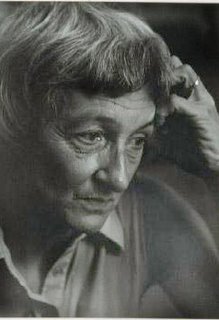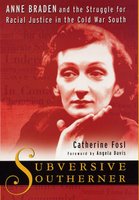 remember is that the barber, who was cutting my hair, referred to her and her husband as “those damned Communist N_____r lovers.” Even then the “N-word” was repulsive to me—my Uncle Frankie Joe Bossmeyer had told me it wasn’t a “nice” word—so the barber’s words got my attention. However, other than his speaking that not nice word, I had no idea what or of whom he was speaking.
remember is that the barber, who was cutting my hair, referred to her and her husband as “those damned Communist N_____r lovers.” Even then the “N-word” was repulsive to me—my Uncle Frankie Joe Bossmeyer had told me it wasn’t a “nice” word—so the barber’s words got my attention. However, other than his speaking that not nice word, I had no idea what or of whom he was speaking.It was a time in Louisville of what I have heard termed as informal segregation. People had an “understanding” that African-Americans lived in one part of the city and didn’t live in other parts. If an African-American family attempted to purchase or rent a home in one of those “other parts,” the owner of the property was obligated not to sell or rent to them. Attacking that informal segregation is how she and her husband, Carl, became famous.
In 1954 Anne and Carl Braden purchased a house for Andrew Wade and his wife, an African-couple, in a white section of Louisville. They broke the informal segregation rule and enraged the good white folk. Not long after the Wade family moved into their new home, a cross was burned near it, bullets were fired into it, and finally, the Wade home was bombed.
If you’ve heard that the Sixties was the “turbulent decade,” I must remind you that, where Civil Rights were concerned, the Fifties were far from serene. And Anne Braden was right there in the middle of it—at least here in Louisville, Kentucky.
In August 1954, Anne and Carl Braden were indicted by a Louisville grand jury for sedition in relation to their purchase of the house for the Wades. Carl Braden was found guilty in the trial that followed, fined $5,000.00, and sentenced to 15 years in prison. The conviction was appealed and overturned by the United States Supreme Court that ruled state sedition laws were illegal.
Carl Braden died in 1975, but Anne continued her social and civil rights activism. I met her several times, both in the 1970s and ‘80s when I was a social worker and after my return to Louisville in the 1990s in my role as an ordained minister. I cannot claim to have known her personally; I can declare that I respected her and the work to which she dedicated her life.
Anne Braden died Monday morning, March 6th, here in Louisville. She was 81 years old. She will be mourned and missed by many—including me.
More About Anne Braden: Books & Links

Subversive Southerner: Anne Braden and the Struggle for Racial Justice in the Cold War South

The Wall Between
Kentucky Educational Television: living the story/The Civil Rights Movement in Kentucky: Anne Braden
Kentucky Alliance Against Racist & Political Repression: The Braden Center
Facing South (blog): In Memory of Anne Braden
Fellowship: Finding the Other America by Anne Braden
The Veterans of Hope Project: An Interview with Anne Braden
Columbia Law School: Anne Braden
Colorlines: Inside-Out and Upside-Down: An Interview with Anne Braden

Wow, she and her husband sound like incredible people. I must try and get one of those books, has me very fascinated.
ReplyDeleteThanks for posting this :o)
I remember the Braden name but not the story. Thanks.
ReplyDeletecool story.
ReplyDeletehey i was looking at your blgger profile and u need to change you job on there.lol
I'm glad I stopped by today and learned something new.
ReplyDeleteOn a somewhat lighter note, it reminded me about the joke about how the Unitarians will burn a question mark on your lawn when they want you out.
What bravery they had. I'm sure you miss her presence and activity very much now. Thanks for educating me.
ReplyDeleteI just read l99's joke about Unitarians...LOL!
ReplyDeleteI remember the Bradens well, Carl and especially Anne. She was a newspaper reporter who had lived in the Deep South, where she hated the injustice of racism. The last time I saw Anne was shortly before I retired. She was a gentle woman; I picture her as the closest I have ever met to Mother Teresa.
ReplyDeleteI don't remember them. We're all beholden to those with the courage to fight for what's right.
ReplyDeleteDon't remember the Bradens but I know that it takes incredible courage to do the right thing when everyone else seems to be going the other way. The only time I remember being in Louisville was back on one weekend in the spring of 1963 when I took a part with a group of street preachers in the town. ec
ReplyDeleteNever heard of her. I may have to check her out...
ReplyDeleteMichelle—Yes, they were dedicated and very exceptional folks. This morning one of the local public radio stations broadcast a history of housing segregation in Louisville. Of course, Carl and Anne Braden were mentioned in the story. It was there courageous act that created a crack in that separation of African Americans from the rest of the community. Of course, the story pointed out that housing segregation still exists here. And as I look at the residents of my own neighborhood, I must agree. There remains a lot of work to be done.
ReplyDeleteMike—I, too, had to be reminded of the story. After all, it began when I was very young.
Chica—Thanks. You remind me that I may have a new job. I desperately need the money, However, I’ll change my profile after I actually get the job and start getting paid!
Limpy—I, too, learned some new facts as I wrote the story. I first heard that story from a Unitarian professor at the Kent School of Social work back in the 1970s. At that Time I did not realize that the Unitarians, at least in the United States, had there origin in one of the predecessor denominations of my own United Church of Christ, the Congregationalists. The U.S. Unitarian founder was William Ellery Channing, a Congregational minister in Boston. He proclaimed his leadership of the Unitarian movement by preaching in 1819 his famous sermon, "Unitarian Christianity,"
Little Sister—Yes, The Bradens were courageous. I really wish I had taken the opportunities I had to get to know Anne better.
Ex-Louisville Guy—From my memories of Anne, she was what is called, I think, “soft-spoken.” Yet her words were powerful.
Squirl—You, too, were young when all of this took place—at least at the beginning of Anne and Carl’s opposition to racial injustice. As I mentioned to Michelle, the struggle still goes on. Sometimes I think that many of what we thought were victories in the Civil Rights movement has been lost since our nation swung politically to the Right.
Mreddie—Yes, it took incredible courage for the Bradens to do the right thing when everyone else seems to be going the other way. I suppose it still does.
Punkmom—Please do check Anne out. The links I listed at the end of the post are just a beginning.